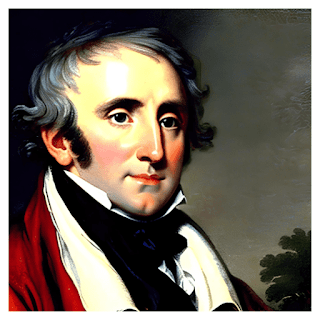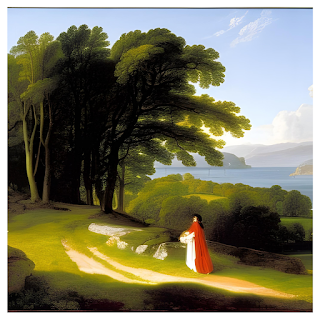Title:
Introduction
"The
Prelude - by William Wordsworth" is a masterpiece of literature that
chronicles the poet's spiritual and artistic journey. It is a poetic
autobiography that takes the reader on a breathtaking journey through
Wordsworth's life experiences, emotions, and reflections.
In this
article, we will delve into the depths of this epic poem and explore the alluring
beauty of nature that is a central theme in "The Prelude." We will
discover the significance of this work in the Romantic movement and its impact
on English literature.
So, fasten
your seat belts and get ready to embark on a mesmerizing journey through the
pages of "The Prelude - by William Wordsworth."
The Prelude - A Journey through Nature
"The
Prelude" is a long poem consisting of 14 books and over 7,000 lines. It
was written by Wordsworth in his later years, reflecting upon his early life
experiences, especially his intense connection with nature.
The poem
takes the reader on a journey through the hills, valleys, rivers, and forests
of Wordsworth's childhood in the Lake District of England. He explores the
enchanting beauty of nature and reflects on its profound impact on his life and
artistic vision.
Let's dive
into some of the most fascinating aspects of "The Prelude - by William
Wordsworth."
1. Nature as a Source of Inspiration
Wordsworth
believed that nature was the source of all true inspiration and creativity. He
saw it as a manifestation of divine beauty and believed that the spiritual
power of nature could transform human consciousness.
In "The
Prelude," he expresses his deep admiration for nature and the ways in
which it has inspired him to write poetry. He writes:
"Nature
then
( The
coarser pleasures of my boyish days,
And their
glad animal movements all gone by)
To me was
all in all. — I cannot paint
What then I
was. The sounding cataract
Haunted me
like a passion: the tall rock,
The
mountain, and the deep and gloomy wood,
Their
colours and their forms, were then to me
An appetite;
a feeling and a love,
That had no
need of a remoter charm,
By thought
supplied, or any interest
Unborrowed
from the eye."
These lines
beautifully illustrate the intensity of Wordsworth's connection with nature and
his belief in its transformative power.
2. The Influence of Childhood on Adult Life
One of the
central themes of "The Prelude" is the influence of childhood
experiences on adult life. Wordsworth believed that the experiences and
emotions of childhood shape one's personality and worldview.
In the poem,
he reflects on his own childhood experiences in the Lake District, and how they
have influenced his adult life. He writes:
"Thus
the mind,
Ensues the
fancy upon thoughtful hours
Though
silent, yet with understanding heart
Observing,
in a measure, her own works."
These lines
show how childhood memories have a lasting impact on the mind, even in
adulthood.
3. The Spiritual Significance of Nature
Wordsworth
believed that nature had spiritual significance, and that the beauty and
harmony of the natural world reflected the divine. In "The Prelude,"
he explores this theme in depth, showing how nature can inspire spiritual
transformation.
He writes:
"The
earth, and every common sight,
To me did
seem
Apparell'd
in celestial light,
The glory
and the freshness of a dream."
These lines
beautifully illustrate how Wordsworth saw the spiritual significance of nature,
and how it could inspire feelings of awe and wonder.
4. The Romantic Movement and "The Prelude"
"The
Prelude" is considered one of the most important works of the Romantic
movement, a literary and artistic movement that emerged in the late 18th
century. The Romantics rejected the rationalism and industrialization of the
Enlightenment era, and instead celebrated the beauty of nature, emotion, and
individualism.
Wordsworth
was one of the key figures of the Romantic movement, and "The
Prelude" reflects many of its core values. The poem celebrates the beauty
of nature and the power of the imagination, and expresses a deep appreciation
for individual experience and emotion.
5. The Impact of "The Prelude" on English Literature
"The
Prelude" had a significant impact on English literature, both in its own
time and in later years. It was one of the first works to explore the beauty
and spirituality of nature in such depth, and it helped to establish the
Romantic movement as a major literary force.
Many later
writers were influenced by "The Prelude," including John Keats, Percy
Bysshe Shelley, and Samuel Taylor Coleridge. The poem's emphasis on individual
experience and emotion also influenced the development of modernism and other
literary movements.
6. FAQs about "The Prelude"
Q: What is
the structure of "The Prelude"?
A: "The
Prelude" consists of 14 books and over 7,000 lines of blank verse.
Q: What is
the main theme of "The Prelude"?
A: The main
theme of "The Prelude" is the spiritual and artistic journey of
William Wordsworth, with a focus on his connection with nature.
Q: Why is
"The Prelude" considered important in English literature?
A: "The
Prelude" is considered important because it helped to establish the
Romantic movement as a major literary force, and influenced many later writers.
7. Conclusion
In
conclusion, "The Prelude - by William Wordsworth" is a masterpiece of
literature that explores the beauty and spirituality of nature, and the impact
of childhood experiences on adult life. It is a powerful expression of the
Romantic values of individualism, emotion, and imagination, and had a significant
impact on English literature.
Through his
poetic words, Wordsworth takes the reader on a breathtaking journey through the
hills, valleys, and forests of his childhood, and invites us to discover the
alluring beauty of nature for ourselves. "The Prelude" is a timeless
work of art that continues to inspire and captivate readers to this day.


